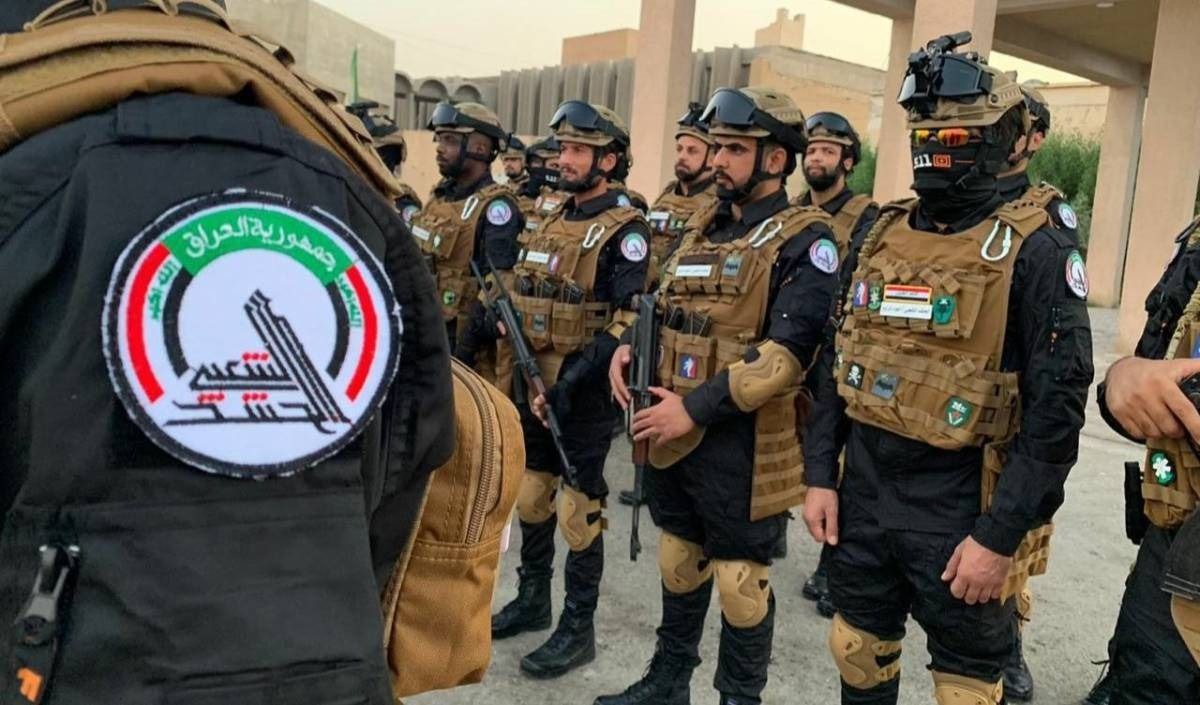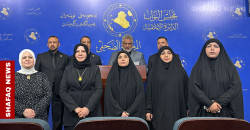Iraq's PMF Service and Retirement Law: Is political exploitation inevitable?

Shafaq News/ Iraq's Popular Mobilization Forces (PMF) face a heated political battle over the controversial PMF Service and Retirement Law, especially within the Shiite house. As factions clash over its passage and retirement age provision, some propose a ‘one basket’ approach, prompting calls for public pressure to prevent political manipulation.
PMF & Its Law
The PMF was established in 2014 following a fatwa by top Shiite cleric Ayatollah Ali al-Sistani to combat ISIS. They fought alongside the Iraqi army and the Global Coalition and have since become a key force in Iraq’s security landscape, with their funding increasing from $2.16 billion in 2021 to $2.6 billion for 2023-2025. Its membership is around 200,000, comprising about 70 factions from various religious and ethnic backgrounds, though it remains predominantly Shiite.
On November 26, 2016, Iraq’s parliament passed a law formalizing these factions, known as the PMF Law, by a majority vote, despite a boycott by Sunni MPs from the Iraqi Forces Alliance, who saw it as “undermining national partnership.” It designates the PMF as a supporting force alongside the Iraqi Armed Forces, under the authority of the Commander-in-Chief, currently Prime Minister Mohammed Shia Al-Sudani, while also establishing a leadership structure with a general command, staff, and combat brigades, placing the PMF under military laws and banning political activity within its ranks. The law, which has already passed its first and second readings, aims to provide members with permanent employment status, retirement benefits, and social security.
Disagreements Over the Law
The PMF law now is at the center of a growing debate among groups within the Coordination Framework (CF)—an alliance of all Shiite parties in Iraq, excluding the Sadrist Movement—over two key issues: First, the PMF law, which has been under discussion for years, remains unapproved by the Iraqi parliament. Second, the law’s potential impact on the retirement of the PMF’s head Faleh Al-Fayyad, a prominent Shiite figure who has surpassed the legal age for holding a ministerial position.
Supporters say the proposed legislation is crucial to formalize and regulate the PMF, while opponents argue it is designed to sideline current leaders and weaken the force. Some speculate that its passage could pave the way for integrating the PMF into the Iraqi army.
Earlier parliamentary sessions have seen boycotts from MPs who oppose the exclusion of the law from the legislative agenda, with leaders from within the CF holding a series of intensive meetings to resolve the mounting legal challenges surrounding it.
Iraq’s Cabinet recently approved a new draft law for the Popular Mobilization Forces and referred it to Parliament for a vote, the Prime Minister’s media office said.
400 Leaders Without Replacements
The proposed PMF Retirement and Service Law has gained broad support, with "most political forces agreeing on it," including Sunni MPs in the Security and Defense Committee, according to Ali Nima al-Bandawi, a member of the committee. However, some concerns remain about the ages of the PMF leaders. "If the law is presented in its current form, it is expected that 400 brigade and directorate commanders will be retired, and there are no replacements for them," he affirmed to our agency.
To address this, a three-year implementation delay was agreed upon by the committee. During this period, "the PMF will prepare, train, and select leaders" to fill the vacancies left by the retirees, including brigade and division commanders, and heads of directorates, the General Staff, and the General Secretariat.
The MP confirmed that the law was under review in parliament. "Discussions took place last week with key PMF figures," including Badr Organization Secretary-General Hadi al-Amiri, the PMF secretary, and the directors of the administrative and legal departments. The final remarks are expected to be addressed in the coming period, making the law ready for a vote.
Earlier, Rafiq Al-Salihi, an MP from the Sadiqun Bloc—which, along with the State of Law Coalition, is one of the law’s strongest backers—disclosed that political factions have agreed to finalize the law in the next parliamentary session. "The retirement provision will remain unchanged, set at age 60, with PM Al-Sudani granted the authority to extend service by an additional five years for qualifying PMF members, based on criteria to be defined,” he clarified.
Electoral or Political Exploitation
The PMF Law, with its 82 articles, has sparked controversy. Political analyst Saif Al-Saadi warned that Article 32/Third, which grants Al-Fayyad sweeping authority to retire personnel for reasons such as incompetence, could be exploited for "electoral or political purposes." He pointed out that this provision could be used to force members into retirement, especially if they fail to participate in elections.
"Lawmakers should pay attention.”
Further complications have arisen within the CF over the retirement age for Al-Fayyad. “The PMF’s head, who has surpassed the legal retirement age, has had his retirement postponed due to political pressure. Some factions support passing the law to serve their own interests, while others oppose it, fearing it would harm them,” he stressed.
In turn, Basem Khashan, a member of the Parliamentary Integrity Committee, emphasized that laws should be judged on their substance, not political agendas. "Any law that passes through parliament and secures a majority is a legitimate law," he noted. However, he lamented that "many laws, including the Amnesty, Personal Status, and Property Restitution laws, have been passed without achieving a true majority, often voted on collectively in a single package."
Repeating the "One Basket" Experience
Shiite factions have proposed amendments to the PMF law to ensure its smooth passage, sources within the Iraqi Parliament told Shafaq News Agency. However, the approval of this law is tied to other political demands, including the dissolution of the Accountability and Justice Commission for the Sunni component and the recognition of Halabja as an Iraqi province, a key demand of Kurdish parties.
Speculation exists, they confirmed, that some controversial laws could be included in the same basket, following the precedent of passing three contentious laws together.
State of Law MP Thaer Mukhyaf Al-Jubouri argued that the practice of passing controversial laws in a single package undermines democracy. "This applies to future laws, which could be easily passed despite objections from certain factions," he said.
Mukhyaf also noted that the PMF law includes alternative proposals to address some of its disputed clauses, such as the legal retirement age. Under the proposed changes, brigade commanders who exceed or will exceed the retirement age could be reassigned as security advisors and receive a monthly financial reward for their continued efforts.
The final decisions on these proposals reportedly rest with the Legal and Security & Defense Committees, which will review their feasibility within the framework of the law.
Public Pressure Is the Solution
Controversial laws, according to political analyst Aed al-Hilali, "primarily aim to broaden the electoral base for MPs or political blocs," a challenge that has plagued Iraq since the 2005 elections. This persistent issue, he pointed out to our agency, can only be tackled through significant public pressure. "Without it, political blocs will continue to dominate, exploiting the political process and state resources to serve their leaders' families."
To break this cycle, al-Hilali highlighted the need for a shift in public awareness, emphasizing the importance of forming a coalition of civil society organizations, intellectuals, state elites, professors, and lawyers. "These groups must unite to express their aspirations and take responsibility for reshaping political paths," he said, calling for new behaviors and patterns that empower citizens to actively shape the state's public policies.





